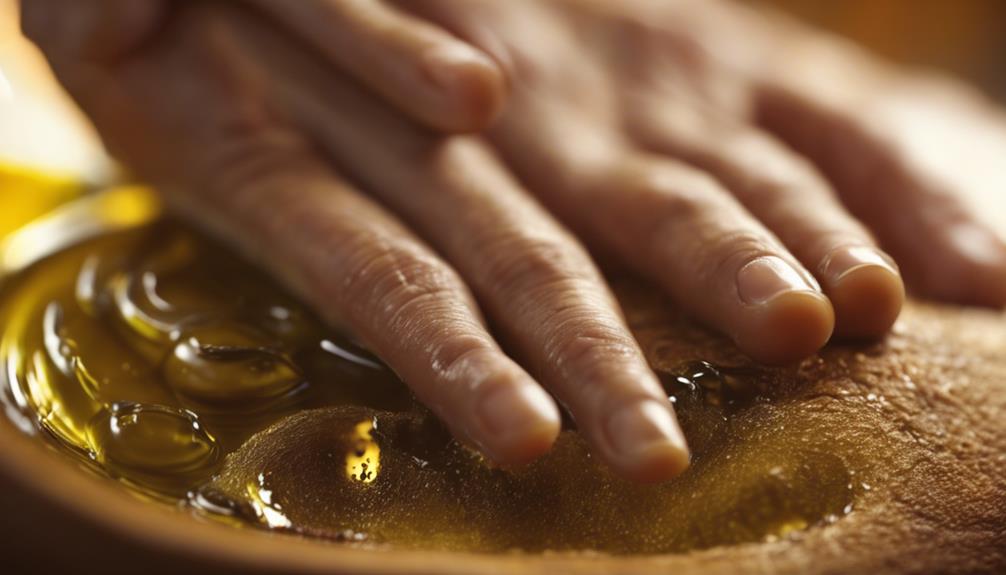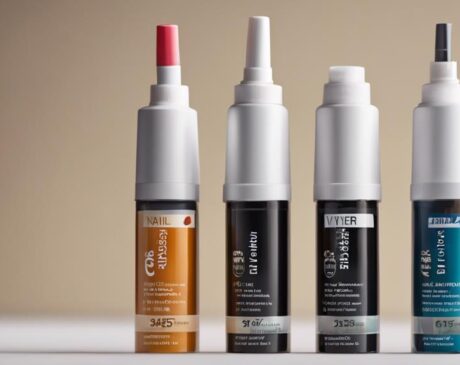Is Olive Oil Just as Good as Cuticle Oil?

Olive oil and cuticle oil offer unique benefits for nail care. Olive oil has natural moisturizing properties, rich nutrients like oleic acid, and antioxidants. Cuticle oil deeply penetrates, hydrates, and prevents dryness. Choose cuticle oil for intense hydration, olive oil for natural benefits, or experiment to find what works best for you. Both options have their advantages in nail and cuticle care.
Key Takeaways
- Olive oil provides natural moisturization and essential nutrients.
- Cuticle oil deeply penetrates for intense hydration and nail bed flexibility.
- Olive oil offers general moisturization with limited additional nutrients.
- Cuticle oil prevents dryness, cracking, and enhances a polished look.
- Consider specific needs and budget to choose between olive oil and cuticle oil.
Benefits of Olive Oil for Cuticles

When considering the benefits of olive oil for cuticles, its natural moisturizing properties and rich nutrient content stand out as key factors in promoting healthy nail beds. Olive oil is packed with essential fatty acids, such as oleic acid, which help to nourish and hydrate the delicate skin around the nails, preventing dryness and cracking. Additionally, olive oil contains antioxidants like vitamin E, which can protect the cuticles from environmental damage and premature aging.
Moreover, olive oil has anti-inflammatory properties that can help soothe irritated cuticles and reduce redness and swelling. Its ability to soften the skin makes it easier to push back cuticles gently, promoting better nail growth and overall nail health. The lightweight nature of olive oil allows for quick absorption, ensuring that the cuticles receive maximum benefits without leaving a greasy residue.
Effectiveness of Olive Oil Vs. Cuticle Oil
Comparing the effectiveness of olive oil and cuticle oil in promoting nail and cuticle health reveals distinct advantages and considerations for each option. While both oils can hydrate and nourish the cuticles, cuticle oil is specifically formulated to target the delicate skin around the nails. Cuticle oil often contains additional beneficial ingredients like vitamin E, jojoba oil, and other essential oils tailored to enhance nail strength and health. On the other hand, olive oil, a versatile household staple, can also provide moisture and nourishment to the cuticles but may lack the specialized nutrients found in cuticle oil. Here is a comparison table highlighting key aspects of both oils:
| Criteria | Olive Oil | Cuticle Oil |
|---|---|---|
| Ingredients | Pure olive oil | Contains additional vitamins and oils |
| Specialization | General moisturization | Specifically formulated for cuticle care |
| Nutrient Content | Limited additional nutrients | Enriched with vitamins and essential oils |
| Absorption Rate | Moderately fast | Quick absorption for targeted benefits |
| Fragrance | Natural olive scent | Infused with various pleasant scents |
Nourishing Properties of Olive Oil

Nourishing the cuticles with olive oil provides essential moisture and nutrients for promoting overall nail health. Olive oil is rich in vitamins and antioxidants, such as vitamin E, which help strengthen the nails and prevent breakage. The hydrating properties of olive oil can penetrate the skin around the nails, softening the cuticles and making them easier to push back during a manicure. Additionally, olive oil contains fatty acids that nourish and protect the delicate skin of the cuticles, keeping them healthy and preventing dryness.
When used regularly, olive oil can improve the appearance and texture of the cuticles, making them look smoother and more hydrated. Its natural properties make it an effective alternative to commercial cuticle oils, offering a cost-effective and natural solution for nail care. By incorporating olive oil into your nail care routine, you can ensure that your cuticles receive the essential nutrients they need to stay healthy and promote strong, beautiful nails.
Moisturizing Benefits of Cuticle Oil
To enhance the health and appearance of your cuticles, incorporating a quality cuticle oil into your nail care routine can provide essential moisturizing benefits. Cuticle oil is formulated to deeply penetrate the skin around the nails, delivering hydration and nourishment where it is needed most. Unlike some other oils, cuticle oil is specifically designed to mimic the natural oils produced by the skin, ensuring optimal absorption and effectiveness.
The moisturizing benefits of cuticle oil are manifold. By hydrating the cuticles, this specialized oil helps prevent dryness, cracking, and peeling, promoting overall nail health. Additionally, regular use of cuticle oil can improve the flexibility of the nail bed, reducing the risk of painful hangnails and promoting stronger, healthier nails. Moreover, the moisturizing properties of cuticle oil can contribute to a more polished and professional look for your nails, enhancing the appearance of your manicure. For those seeking innovation in their nail care routine, the moisturizing benefits of cuticle oil make it a valuable addition to promote healthy, beautiful nails.
Choosing the Best Option for You

Have you considered the key factors to help determine the most suitable option for your nail care routine? When choosing between olive oil and cuticle oil, it's essential to assess your specific needs and preferences. Cuticle oil is specially formulated to target the delicate skin around your nails, providing intense hydration and nourishment. It often contains a blend of beneficial ingredients like vitamins, essential oils, and botanical extracts designed to promote healthy nails and cuticles.
On the other hand, olive oil, while a natural alternative, may lack some of the specialized components found in cuticle oil. However, if you prefer a more organic approach to nail care, olive oil can still offer moisturizing benefits. Consider factors such as your budget, the severity of your cuticle dryness, and any specific nail concerns you may have when making your decision.
Ultimately, the best option for you will depend on your individual preferences and needs. Experimenting with both olive oil and cuticle oil can help you determine which product works best for your nails, cuticles, and overall nail care routine.
Frequently Asked Questions
Can Olive Oil Be Used as a Cuticle Oil Alternative in a Pinch?
In a pinch, olive oil can serve as a suitable alternative to cuticle oil due to its hydrating properties. While not specifically formulated for cuticles, olive oil's nourishing benefits can help maintain healthy nails and cuticles.
Are There Any Potential Drawbacks or Side Effects to Using Olive Oil on the Cuticles?
While olive oil can provide hydration and nourishment to cuticles, potential drawbacks include its heavy texture, which may feel greasy and attract dirt. Additionally, some individuals may be sensitive or allergic to components in olive oil.
How Often Should Olive Oil Be Applied to the Cuticles for Optimal Results?
To achieve optimal results when applying olive oil to cuticles, it is recommended to do so at least twice a day. Consistent application of this natural remedy can help nourish and strengthen the cuticles, promoting healthier nails.
Are There Specific Types or Grades of Olive Oil That Are Better for Cuticle Care?
When considering olive oil for cuticle care, opt for extra virgin olive oil. Its high-quality, unrefined nature preserves nutrients beneficial for nourishing cuticles. Choose a cold-pressed variety for maximum benefits in promoting healthy and moisturized cuticles.
Can Olive Oil Help With Other Nail or Skin Issues Besides Cuticle Health?
Olive oil, a versatile elixir, boasts a plethora of benefits beyond cuticle care. Its antioxidants and moisturizing properties can aid in nourishing skin, strengthening nails, and combating dryness. Embrace its natural prowess for holistic beauty.




